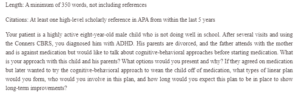Attention Deficit Hyperactivity Disorder
ADHD is a common childhood neurobehavioral disorder (CDC, 2021). The child may be overly active, impulsive, or have poor concentration, causing difficulties at home and school. The condition can successfully be managed, although it cannot be cured. ADHD commonly lasts a lifetime, though symptoms improve with age.
In approaching this child (case patient) and his parents, I would help the parents reconcile with the realities of Attention-Deficit / Hyperactivity Disorder. First, they must understand that the disorder is most challenging in childhood. The child will exhibit symptoms that include frequent forgetting or losing things, excessive talking, careless mistakes, unnecessary risk-taking, difficulties in relationships, squirming, or fidgeting, among others. Secondly, the parents need to learn about the three types of ADHD depending on the most muscular symptoms. The predominantly inattentive type presents with easy distractibility and difficulty organizing tasks, paying attention to details, or following instructions. The predominantly impulsive-hyperactive type is restless, impulsive, interruptive, and prone to injuries. The combined type has symptoms of both types present. Additionally, the parents need training on symptom management and providing a healthy lifestyle for the child, such as limiting screen time.
Treatment options include pharmacological and cognitive-behavioral therapies. The child and family dynamics are vital in determining the best treatment modality. Generally, behavior therapy is effective for children under five years. However, a combination of behavior therapy and medication is recommended for children six years and older (Wolraich & Hagan, 2019). Behavior therapy is essential to learning or strengthening positive behaviors while diminishing problem behaviors (Wolraich et al., 2019). Close monitoring is required to determine if and how the treatment is helpful to the child. In addition, I would recommend parent education and support and classroom interventions.
ADHD, like most other chronic illnesses, uses long-term planning principles. Its management is multidisciplinary and multi-professional. A four-year linear plan for the case patient would include setting target behavior outcomes, follow-up activities and monitoring, ADHD education, medication, and family counseling. The plan requires team efforts involving pediatricians, counselors, psychologists, parents, the child, caregivers, teachers, and other healthcare professionals. As the child enters adolescence, the plan will be reviewed and adjusted for the new life phase.
References
Centers for Disease Control and Prevention. (2021). Attention-Deficit / Hyperactivity Disorder (ADHD). https://www.cdc.gov/ncbddd/adhd/facts.html
Wolraich, M. & Hagan, J. (2019). Updated ADHD guideline addresses evaluation, diagnosis, and treatment from ages 4-18 https://publications.aap.org/aapnews/news/14578?autologincheck=redirected.
Wolraich, M., Hagan, J., Allan, C., Chan, E., Davison, D., Earls, M., Evans, S., Flinn, S., Froehlich, T., Frost, J., Holbrook, J. Lehmann, C., Lessin, H., Okechukwu, K., Pierce, K., Winner, J. & Zurhellen, W. (2019). Clinical Practice Guideline for the Diagnosis, Evaluation, and Treatment of Attention-Deficit/Hyperactivity Disorder in Children and Adolescents. Pediatrics 144(4): https://doi.org/10.1542/peds.2019-2528
ORDER A PLAGIARISM-FREE PAPER HERE
We’ll write everything from scratch
Question

Attention Deficit Hyperactivity Disorder
Length: A minimum of 350 words, not including references
Citations: At least one high-level scholarly reference in APA from within the last five years
Your patient is a highly active eight-year-old male child who is not doing well in school. After several visits and using the Conners CBRS, you diagnosed him with ADHD. His parents are divorced, and the father attends with the mother and is against medication but would like to talk about cognitive-behavioral approaches before starting medication. What is your approach with this child and his parents? What options would you present and why? If they agreed on medication but later wanted to try the cognitive-behavioral approach to wean the child off of medication, what types of linear plan would you form, who would you involve in this plan, and how long would you expect this plan to be in place to show long-term improvements?

